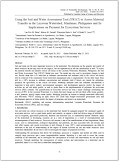| Journal Article |
 |
|
| Article Title | Using the Soil and Water Assessment Tool (SWAT) to Assess Material Transfer in the Layawan Watershed, Mindanao, Philippines and Its Implications on Payment for Ecosystem Services | | Author | Leo Kris Mariano Palao, Moises M. Dorado, Kharmina Paola Angat Anit and Rodel D. Lasco | | Year | 2013 | | Journal Title | Journal of Sustainable Development | | Institution | Canadian Center of Science and Education | | Volume | 6 | | Issue | 6 | | Pages | 73-88 | | Call Number | JA0485-13 | | Keywords | SWAT, modeling, soil erosion, sedimentation, watershed, Layawan Watershed, Payments for Ecosystem Services (PES), land use change |
|
| Abstract: |
| Soil and water are the most important resources in the watershed. The alterations on the quantity and quality of
these resources do not only have on-site impacts, but are experienced by off-site communities as well. To assess
the material transfer and identify critical sub-basins in the Layawan Watershed, Mindanao, Philippines; the Soil
and Water Assessment Tool (SWAT) Model was used. The model was also used to investigate changes in land
use. Results show that a 4% reduction in sediment concentration and sediment yield in the critical sub-basins
will be achieved if the community-based watershed management plan is implemented. On the other hand, there
will be a 106% increase in sediment concentration and sediment yield if forests are cleared for utilization,
primarily for agriculture, in the critical sub-basins. Modeling sediment yield and sediment concentration is
important to help policy makers, environmental managers, and development agencies predict the impact of
activities on soil and water quality, as well as guide them in the implementation of payments for ecosystem
services (PES) schemes. The quantification of ecosystem services has been a major challenge surrounding the
success of PES. In the Layawan Watershed, it is shown that land change use will not likely affect water quantity,
it will, however, heavily impact water quality. Modeling provides an avenue to manage watersheds effectively
and efficiently. SWAT running on open source GIS could help budget-constrained government units and
development agencies to better predict the impact of programs and projects on watersheds. |
|
|
Download file(s): Click icon to download/open file.
|
| |
File Size |
Description |

|
- |
URL |
|
|
GRP 4: Reducing risks to land health and targeting agroforestry interventions to enhance land productivity and food availability
|
| Viewed in 1722 times. Downloaded in 410 times. |